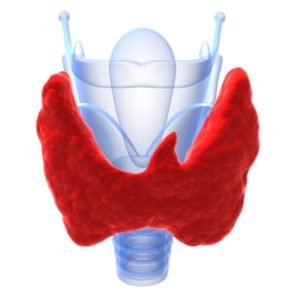8 Best Foods for Thyroid Health

Having an underproductive thyroid—AKA hypothyroidism—is not a condition to be taken lightly, since it can lead to health problems such as fatigue, weight gain, brain fog, recurrent and chronic infections, insomnia, joint pain, anxiety, depression, short-term memory loss, hair loss, type 2 diabetes and heart disease.
However, the good news is that you can help maintain optimal thyroid function through some simple changes in your diet by adding nutrients which are key to the thyroid’s overall function.
Since your thyroid’s main function is to produce hormones which are critical to your health, this means you are helping save yourself from some highly detrimental health conditions, or to improve those you are currently suffering from.
Even better?
These foods are not only nutritious and part of a balanced diet of natural whole foods, but they are readily available and great-tasting.
Here are the top 8 foods for keeping your thyroid—and you—functioning in a healthy and productive manner.
What is the Thyroid?
 Located at the front of the neck, this small butterfly-shaped gland is responsible for releasing hormones which maintain a healthy metabolism. It is needed for proper functioning of every cell in your body. It regulates the growth and development of your body.
Located at the front of the neck, this small butterfly-shaped gland is responsible for releasing hormones which maintain a healthy metabolism. It is needed for proper functioning of every cell in your body. It regulates the growth and development of your body.
And, since it has such control over your body’s energy, it also has effects on:
- Your body mass index (BMI)
- Muscle strength
- Heart and respiratory rates
- Central and peripheral nervous systems
However, this valuable part of your endocrine system needs a few vital nutrients to function and produce its two main hormones, which are triiodothyronine (T3), and thyroxine (T4). Without this, your energy and metabolism have nothing to support them, and the results can be very dangerous to your health. (1)
Nutrients for Your Thyroid Gland
Fortunately, most thyroid symptoms can be traced to some key nutrients and minerals it needs to do its job. These can include:
- Selenium—Selenium supplies in the body are most prominent in the thyroid, where it is required for its antioxidant properties and to metabolize thyroid hormones. (2)
- Iodine—A common reason for hypothyroidism is a lack of iodine in the diet, since this mineral is necessary in the production of T3 and T4, which are necessary in controlling your metabolism. (3)
- Zinc—Zinc is another trace mineral which is necessary in the production of thyroid hormones. However, thyroid hormones are also necessary in the absorption of zinc, which can compound a zinc deficiency through lack of absorption. (4)
- Iron—Research studies on both animals and adult humans indicate an association with iron deficiency (anemia) and the altered metabolism of thyroid hormones. (5)
8 Best Foods for Thyroid Health
As far as where to get a natural supply of thyroid-friendly nutrition, there are many foods which can help. Since most are good-tasting and easily purchased at most grocery stores, you shouldn’t have trouble finding ones which fit your needs.
However, the important thing to remember is, these foods should be a regular part of a healthy, all-natural diet which avoids processed foods containing hydrogenated fats and oils, trans fats, added sugars and low fiber.
Instead, a diet rich in multicolored fruits and vegetables (preferably organic), lean grass-fed meats, seafood and poultry should be adhered to, and organic options should also be utilized whenever possible.
Try these 8 foods for optimum thyroid health:
1. Seaweed—Sea vegetables are one of nature’s richest sources of iodine and iron, both of which are critical to the healthy functioining of your thyroid gland. These can include tasty varieties of seaweed such as kelp, sea palm, nori, wakame and kombu. Try enjoying the sweet, crunchy saltiness of sea palm as a snack, or crumbled on salads, soups or other foods; or you can be creative with nori wraps in making your favorite wrap recipes, such as tuna or veggie wraps. (6)
2. Brazil nuts—These large rainforest nuts may be hard to crack, but they are one of the richest sources of thyroid-friendly selenium you can find. In addition to snacking on them, they can also be substituted for pine nuts in pesto, or you can even make your own dairy-free nut milk with them. (7)
3. Pumpkin seeds—Not only are pumpkin seeds tasty and versatile, they are also an excellent source of zinc, which your thyroid needs for healthy hormone production. It should also be noted that thyroid hormones are necessary for the uptake of zinc by the body, meaning low levels of this critical mineral can lead to low levels of thyroid hormones, and vice-versa.
Try adding raw pumpkin seeds to everything from soups and salads to guacamole. They can also be mixed with beans, carrots and seasonings and formed into patties for homemade veggie burgers. (8)
4. Sardines—Another selenium rich food are sardines, although it isn’t just selenium which these sustainable fish from low on the food chain (which means low in heavy metals) can deliver. In fact, they are also high in omega-3 fatty acids, zinc, selenium, vitamin-D and iodine, all of which can benefit your thyroid.
In addition to enjoying them right out of the can, you can also use them to top salads, add to soups and stews for flavor, or mix together with olive oil, chopped olives, cracked pepper and minced sundried tomato for a tasty (and nutritious) fish spread. (9)
5. Apples and pears—Pectin is a type of soluble fiber found in fruits such as apples and pears, which helps the body cleanse itself of heavy metals. Since mercury is a heavy metal that is associated with thyroid problems, such as the underproduction of hormones, adding pectin-rich foods can help remove it and its potential to cause hypothyroidism.
However, whether you enjoy organic fruits which are high in pectin, or you slice them into deserts or salads, remember to ALWAYS leave the skin on, since that is where the most pectin (and nutrition) is. (10)
6. Eggs—For a powerful nutritional punch, add eggs to your diet. Not only are these wonders of nature full of thyroid-friendly zinc, selenium, vitamin-D, iodine and iron, they are also one of the most versatile foods on the planet.
Try boiling eggs for a quick and satisfying snack during your day, or enjoy an omelet filled with other nutritious foods, such as zinc-rich spinach or iodine rich sea vegetables. However, remember that while the whites are protein-rich, the yolks are where all the nutrition is, so no egg white omelets. (11)
7. Oysters—Another rich source of zinc, selenium and iodine are oysters. And, while some may be put off by the texture or have concerns over their safety (they can contain certain pathogens if harvested in low-saline waters), you can enjoy tins of smoked oysters, or such cooked delicacies as Oysters Rockefellers. (12, 13),
8. Berries—Berries such as blueberries, raspberries and huckleberries are rich sources of antioxidants, which play a major role in preventing cellular damage of the thyroid, which can lead to slowing thyroid production. Plus, antioxidant-rich berries are the perfect healthy desert or snack during the day, and as a seasonal food, you can also enjoy different varieties throughout the year for some monotony-busting variety. (14)
About Goitrogens
While these top 8 foods for your thyroid can help you enjoy healthy thyroid hormone production, there are also some foods to avoid which can interfere with normal thyroid function. Goitrogens can inhibit the production of thyroid hormones. They cause swelling of the thyroid gland, known as a goiter.
For thyroid health and the avoidance of goiters (swelling of the thyroid gland), you need to avoid these foods:
- Soy foods, including tofu, tempeh, soymilk and edamame.
- Some nuts and seeds, including pine nuts and peanuts.
- Certain raw vegetables, such as kale, Brussels sprouts or broccoli.
- Starchy fruits and tubers, including casaba melon, peaches and sweet potatoes.
While some of the foods in these groups may contain enough beneficial nutrition along with low enough values of goitrogens to be safe for you to eat, most should be avoided, especially by anyone with symptoms of hypothyroidism. (15, 16)
Finally
Hypothyroidism is not a condition to be taken lightly, since the health effects of it can not only be unpleasant, but dangerous as well.
And, even if you aren’t currently experiencing any negative low thyroid symptoms, adding foods which can help your thyroid perform at its best is still in your best interest. Since these foods are common and most of us enjoy eating them, you shouldn’t have any problem finding ones which can help you keep your thyroid in a healthy working order.
However, to ignore any conditions which indicate slowing thyroid output such as weight gain, low energy or swelling at the front of the neck, can set you up for far greater health concerns, up to and including an increased risk for heart disease.
So, take care of your thyroid—it’s the only one you’ve got!
Do you have symptoms of hypothyroidism?
Take our symptom checker to find out if you could be suffering from low thyroid function. Don’t wait – it’s time to get your health back on track so you can feel your best!
References:
- https://www.endocrineweb.com/conditions/thyroid-nodules/thyroid-gland-controls-bodys-metabolism-how-it-works-symptoms-hyperthyroi
- https://www.ncbi.nlm.nih.gov/pmc/articles/PMC5307254/
- https://www.ncbi.nlm.nih.gov/pmc/articles/PMC4049553/
- https://www.ncbi.nlm.nih.gov/pmc/articles/PMC3746228/
- https://www.ncbi.nlm.nih.gov/pubmed/12810411
- https://www.bbcgoodfood.com/howto/guide/health-benefits-seaweed
- https://www.dietvsdisease.org/the-best-diet-for-an-underactive-thyroid/
- http://www.berkeleywellness.com/healthy-eating/food/article/pumpkin-seeds-101
- https://nutritiondata.self.com/facts/finfish-and-shellfish-products/4114/2
- https://www.ncbi.nlm.nih.gov/pubmed/18219211
- https://nutritiondata.self.com/facts/dairy-and-egg-products/120/2
- https://nutritiondata.self.com/facts/finfish-and-shellfish-products/4193/2
- https://www.foodsafetynews.com/2010/10/florida-warns-residents-of-eating-raw-oysters/
- https://pdfs.semanticscholar.org/8084/0c89cde62ff3c6700790353913c3c81f0629.pdf
- https://www.ncbi.nlm.nih.gov/pubmed/2464986
- https://www.ncbi.nlm.nih.gov/pmc/articles/PMC4740614/
